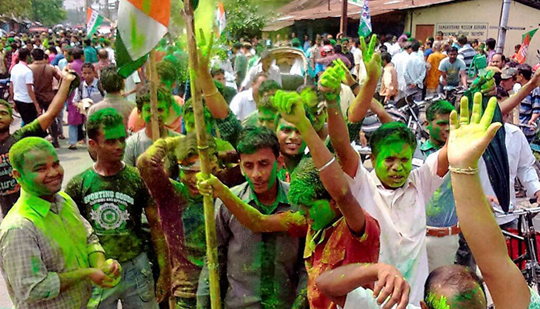Kolkata, May 17: Trinamool Congress won four out of the seven Bengal towns that had gone into municipal election last Sunday and created history by taking control of a Mirik Municipality in the hills and becoming the first political mainstream political party from the plains to win an election in the last three decades.

Trinamool Congress won Pujali in south 24 parganas, Domkal in Murshidabad, Raiganj in north Dinajpur and Mirik in Darjeeling. In all the four municipalities, Trinamool Congress swept the election results.
At Pujali, TMC won 12 out of the 16 wards with BJP coming second with only 2 wards. At Domkal, TMC won 20 out of the 21 wards. The opposition of Congress - Left alliance had initially won 3 wards but immediately after the results, two of them - Rafikul Islam of ward 20 and Ashadul Islam of ward 9 joined Trinamool Congress, cutting down their tally to just 1. This was the first ever election for the Domkal Municipality.
Raigani Municipality, that was in control of Congress prior to the election was also swept by the TMC that won 24 out of the 27 wards. At Mirik TMC won 6 out of 9 wards, beating the Gorkha Janmukti Morcha - BJP alliance for the first time for any political party in the plains since 1986.
The three other towns in the hills - Darjeeling, Kalimpong and Kurseong however remained in control with GJM even as TMC. GJM won 31 out of the 32 seats in Darjeeling and 17 out of 20 wards in Kurseong. At Kalimpong, whose results, came out last among the seven municipalities was also won by the GJM- BJP alliance. The alliance led in 11 out of 23 wards while Harka Bahadur Chhetri led Jan Andolan Party (JAP) won 2 seats and TMC won 2 seats.
Aroop Biswas, the state minister and the Trinamool Congress observer for Darjeeling district said the win at Mirik was the result of chief minister Mamata Banerjee's tireless efforts at the hills and said democracy was restored in several years for the first time in the hills.
"Mamata Banerjee visited the hills several times and has been able to understand the needs of the people and have been able to convince them about their rights. Mirik has opened the doors of development in the hills and we will take it forward to the other places from here and are sure to fare even better in the hills in the coming years," said Biswas.
Trinamool general secretary Partha Chattopadhyay said the wins did not come to him by surprise. "We were expecting the wins but the margin of the victory has been satisfying. At Mirik, people had complained that those in power had done little development and had misused the funds so they have voted for us. Our motto is development and that is the path we are going to tread," he said.
On the day of the election last Sunday, violence was reported from all the three plains towns that went to vote -Pujali in the south (South 24-Parganas), Domkal in the middle (Murshidabad) and Raiganj in the north (North Dinajpur) -though the four Hills towns that voted for new civic agencies (Darjeeling, Kalimpong, Kurseong and Mirik) were peaceful.
State Congress chief Adhir Chowdhury petitioned PM Narendra Modi against alleged rigging of local polls and Left and Congress supporters demonstrated outside the office of the state election commission in Kolkata demanding polls be scrapped all together. The West Bengal Election Commission on Monday ordered a repoll at six booths of three municipalities that took place on Tuesday.
Commenting on the results, opposition parties blamed TMC's alleged violence politics the reason behind their crushing defeat. "Everyone has seen how elections had happened this time. It was a farce in the name of election and after the way they rigged the votes, this result was expected," said Congress leader Prakash Upadhyay.
CPM youth leader Satarup Ghosh said he was unhappy with the way two Congress - Left alliance leaders at Domkal joined TMC right after the win but also criticized TMC for taking them. "This is disgraceful on part of the two to not to respect the people who have voted for them and change parties right after the win. But how could even TMC take them?" he said.








Comments
Add new comment